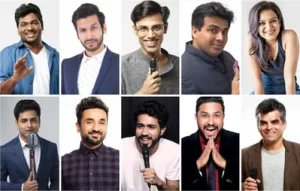
In recent years, the horizon of celebrity reach has expanded outside the field of cinema to include social media influencers, youtubers, etc especially to comedians. Nowadays stand up comedians are being considered no less than influencers and celebrities. But even though these people may become famous, we frequently forget that they are also artists as they go on to show their skills in their respective fields, which in the case of the comedians are their jokes.
As the world is embracing digital expression we find that many of these artists such as the stand-up comedians go on to address social issues through their jokes. However, their jokes have a wide spectrum of audiences. There might be some who take it as a positive joke while some may end up getting themselves offended or hurt their sentiments. Some people may take legal action by filing a complaint against a certain joke or the comedian who made the joke.
There has been an evolution of humour and satire in India, from the themes on which the joke is made to the platforms on which it is done. The proliferation of digital platforms such as Facebook, YouTube, and Twitter came to be used as instruments to revolutionise comedy, but this did not mean that the benefits given on these platforms could completely avoid the constraints on free speech and perceived offence and sometimes the Indian comedians also encounter censorship on their videos.
Since many Indian comedians post their videos on digital spaces like Youtube or Instagram, either a stand-up comedy with audiences or without them, their videos get viral which many a times causes stir in public which backfires against the comedian’s self. Many Indian comedians script jokes on political and religious matters which in turn are not taken positively by the people who are patriotic sensitive. These comedians are now taking their chances to speak the truth righteously through their jokes but they often land up in legal controversies. They are now rising above the traditional and conservative jokes which were racist, misogynistic and sexist to address and raise awareness regarding the social issues in our country.
Although we now see wider acceptance of the public taking political jokes, there are still a handful of people such as the intractable nationalists who cannot face these jokes. Due to them, the space for political comedy in India is shrinking. The intention of the Indian comedians might not be to hurt any nationalist sentiments or any person and their jokes may purely be for entertainment but their jokes might encourage negative reaction and intolerance among people or sometimes certain communities despite their educational and awareness purposes. It might fuel hatred and violent uprisings too.
This creates an uncomfortable online ambience where one cannot express oneself freely. Indian comedians are faced with restrictions on their freedom of speech and expression. We could conceive of it from the example of Vir Das, an Indian comedian, whose stand-up comedy video on ‘Two Indias’ in Washington faced a backlash in India resulting in many police cases and threats against Das. It stirred a controversy although it addressed social and political issues like gender, politics, women’s safety and many others. As such, Das represents the Indian secular community – Indians who are not afraid to deviate from tradition, critique, and advocate for a better connection between government and religion. India has a long and varied relationship with many religions, but humour has been an unified platform for religious and societal criticism in the country. However, the success of Indian comedians like Vir Das may lead to wider public acceptance of India’s secular character, both nationally and abroad.

As the Indian comedians are now gaining fame, they are always under the spotlight and so are their jokes. Due to this, the Indian comedians are always cautious about their jokes. A stand-up comedy video posted by Kenny Sebastian, ‘Why I Don’t Do Jokes About Politics in India’ sheds light on the fears and challenges that Indian comedians have to face. They are wary of the content that they choose.
Munawar Faruqui, an Indian comedian was in jail for almost a month after being accused of hurting religious sensibilities and insulting Hindu gods on extremely flimsy grounds. Despite Faruqui’s subsequent acquittal, his events have been routinely cancelled in response to threats from right-wing groups. This has happened with some other comedians as well where they received death threats and their shows were cancelled. Many comedians defended Faruqui including Vir Das who tweeted, “The system is not just telling comedians what they can joke about, it’s also telling you what you can laugh at. The main target isn’t our pens, it’s your throats.” , which reflects a very harsh reality for Indian comedians.
Hasan Minhaj, an Indian – American comedian was denied entry into the NRG Stadium where the event of ‘Howdy Modi’ took place because of some of the comments made by him on Prime Minister Narendra Modi, Kashmir, Pulwama attack, cow lynchings and many more, ahead of the 2019 Lok Sabha Elections but was still honoured for his comedy.
As the Indian comedians are artists and their jokes are an art form, they also should have the freedom of speech and expression to joke about any theme irrespective of its politico-religious significance, as long as their motive strictly adheres to entertainment purposes and does not hurt the sentiments of any person or community. Their art does not find expression in this global digital space and it is getting difficult day by day to practise their art as their videos are also subjected to trolling and insult,including the young influencers. Therefore, constructive criticism is required instead of death and rape threats directed to the comedians.
In 2020, Hostar made an episode of John Oliver which was critical of our Prime Minister Narendra Modi and his government unavailable and self-censored it without any moral or public outbreak. This, however, in turn backfired the company itself by gaining attention due to its censorship. This self-censorship would follow a path to subordination and would cause harm as it will lead to more censorships along the way.
Since secularism along with the freedom to express yourself freely in a democracy in India is under constant threat, satire in India should be promoted as a means to promote secularism and religious tolerance. In this era where freedom of speech and expression is now clashing with nationalist and religious sentiments, humour can be used as a harbinger of harmony among Indians. It is now high time that we should allow the Indian comedians to do their job and make people laugh without any constraints on their fundamental rights to restore the quality of satire in our country.

